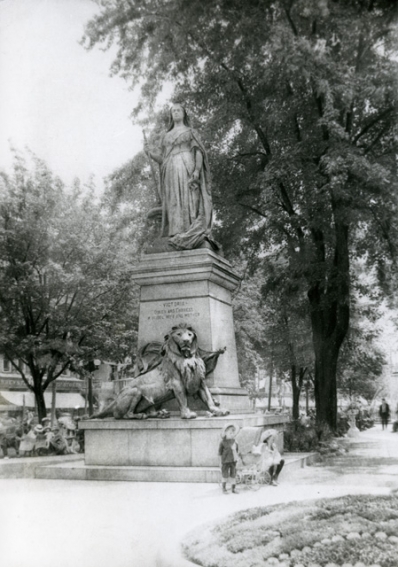The accessible door wave to open function is not working at Carlisle Branch. We aim to get it fixed quickly.
From March 23 until April 12, Valley Park Community Centre will be closed for renovations, reopening April 13. Pool and changerooms will remain closed until early summer 2026.
Valley Park Branch will remain open during the renovations for your library needs.
Filming will take place Mar 3-4, 7am to 11pm, at 1464 Centre Rd. This may impact traffic flow in the surrounding area.
As of Monday, March 2, Concession Branch's Living Room and Makerspace areas are closed. (The next nearest Makerspaces are Sherwood and Terryberry Branches.) Seating may be limited at times. Renovations are expected to be completed in late Spring. Thank you for your patience.
As of Monday, March 2, Sherwood Branch's 2nd floor is closed due to renovations. Makerspace, Children and Teen's collection are temporarily available on the 1st floor. All programs will be held in the basement program room. Renovations are expected to be completed in late Spring. Thank you for your patience.
Starting Tuesday February 10, the First Floor Living Room is closed due to renovation preparations. Study and work spaces are available on Floors 2-4. Thank you for your patience.
Please note the following Bookmobile visit updates.
Wednesday, March 4
St. Elizabeth Village: 1:15-1:45pm - Cancelled
Gemini: 2-2:30pm - Cancelled
Rosedale: 5-6:30pm - Cancelled
Friday, March 6
Winona: 11am-Noon - Cancelled
Queen Victora: 3-4pm - Cancelled
The accessible washroom at Carlisle Branch is not working. We aim to get it fixed quickly.
Effective Sunday, February 1, Sunday service hours at Central Library will be paused.
Sunday Hours will continue at Dundas, Red Hill, Terryberry, Turner Park, Valley Park and Waterdown Branches from 1-5pm.
Queen Victoria Statue

Although plans for a statue to honour Queen Victoria were proposed as far back as 1860, it was not until four days after the Queen's death, on January 26, 1901, that these plans really began to take shape. A group of Hamilton women decided that a memorial to the Queen was in order to pay tribute to her greatness. It was estimated that about $10,000 would need to be collected from the public to cover the costs of building such a monument. The Queen Victoria Statue Memorial Committee was headed by Mrs. John S. Hendrie, their elected president.
Two of the most popular locations proposed for the statue were the mountain brow and the western end of Gore Park. Reasons against placing the statue in Gore Park included:
- it would be smothered by the surrounding high buildings.
- it could only be seen by people within a hundred feet or so of it.
- few, if any, ex-Hamiltonians, or others, outside of Hamilton would contribute to its cost.
- the occasion, having no precedent, demanded something greater.
(as printed in the Hamilton Times, 1901)
The statue, after some debate, was located in the western part of Gore Park. More than five years after the original plans were made, models for the monument were submitted to the committee by various sculptors and a sufficient amount of money was collected. Submissions were made by Philipe Hebert, Montreal; Justin McCarthy, Ottawa; and Mr. Alward, Toronto. On April 14, 1906, the model submitted by Mr. Hebert was chosen and work on the statue began. The following items were placed inside a bag which was enshrined in the cornerstone of the monument: city and telephone directories of 1901 and 1907, a Canadian Almanac of 1901 and 1907, copies of the Times, Spectator and Herald, copies of the revised by-laws and the financial statements of the city, current coins and stamps, a Union Jack, a Canadian flag, a list of the members of the city council, board of education and advisory board, and a copy of the Bible.
A great ceremony was set for the unveiling of the statue, at which even the Governor General, His Excellency Lord Earl Grey, would be present. Lord Grey would later become well-known as the man who gave Canada the cup which is used by the Canadian Football League as their trophy. On May 23, 1908, the Spectator wrote: "Hamilton women are becoming renowned all over Canada for their patriotism. One good deed after another is accomplished by the loyal women of the city, and each good deed redounds to the credit of Hamilton as a whole." At the unveiling of the statue, 22,000 people were in attendance. The Governor General was driven around the city in a car, from James Street to Main Street, to West Avenue, to Hunter Street, to Victoria Avenue, to Stinson Street, to East Avenue, to Main Street, to Delta, to John Street, to Main Street, to Queen Street, to King Street, to Victoria Park, to Dundurn Park, returning by the same route to King and Locke, to Queen Street, to Herkimer Street, to James Street and finally to Gore Park. He was cheered by the great crowds of people as the car approached. The weather that day was reported to be quite nice and everyone was in good spirits.
A guard of honour consisting of 100 men from the Ninety-First Highland Regiment and 100 men from the Thirteenth Regiment was present, as was a great chorus from the city schools. They sang "O Canada" as the band played. According to the Governor General, it was the best he had ever heard the anthem performed. On a platform, near the front were His Excellency the Governor General, Mayor Thomas Joseph Stewart, Hamilton's veteran Postmaster, Mr. Adam Brown, several members of the city clergy, the aldermen and their wives, the members of the Queen Victoria Statue Memorial Committee, and several other prominent citizens. The statue was presented to His Excellency, who was the representative of His Majesty in Canada. The Governor General then pressed a button which caused the statue's coverings to fall and the great monument was unveiled. The band broke into "Rule Britannia" before the Governor General spoke, paying tribute to Hamilton's patriotism and loyalty. After the chorus sang "The Maple Leaf," the statue was presented to the city, and Mr. Adam Brown took the stand to give a speech and eulogy for the late Queen.
In 1958, fifty years after the statue was unveiled, an attempt was made to remove the accumulation of dirt and treat the surface of the statue. Much grime had built up on the statue over the years. This dirt was scrubbed off and a special treatment was used which would help slow the corrosion that was occurring to the great monument. Later still, in 1988, plans were made to clean the statue, which by now had turned green due to oxidation, and to hold a ceremony in June which was very similar to the one that had occurred in 1908. This ceremony was to be complete with Governor General Jeanne Sauve in attendance. The statue was given a major cleaning, with brushes, abrasives and soap solutions being used to restore the original bronze lustre.
Descendants of the original Queen Victoria Statue Memorial Committee were invited to attend the 1988 ceremony, and the Governor General was also present. Jeanne Sauve arrived at City Hall at noon to make a speech. This was followed by a re-creation of the original unveiling ceremony, complete with the Queen Victoria School choir singing "God Save The Queen" and The Celebration Brass playing "Rule Britannia" and "O Canada." The Governor General was then treated to a luncheon at the Hamilton Convention Centre, as well as tours of McMaster University Medical Centre and the Royal Botanical Gardens. Although not in time for the June ceremony, Leo the lion, who is part of the monument, had his tail restored in October of 1988 after it had been broken off and gone missing sometime around 1967. With the tail fully restored and the statue looking very clean, the monument was once again quite a sight to see.
The Queen Victoria monument had become a favourite resting spot for pigeons and in 1996, for the first time since the 1988 ceremony, further maintenance was done on the statue. This time, it was decided that the cleanings should be an annual event. It was also decided that a picture of the statue would be taken each year so that the condition could be noted. The yearly cleaning would include the monument being scrubbed down with a hog-bristle brush and non-ionic detergent and allowed to dry. After this, it would be given a hand-rubbed coat of microcrystalline wax, to keep it protected and looking good.












